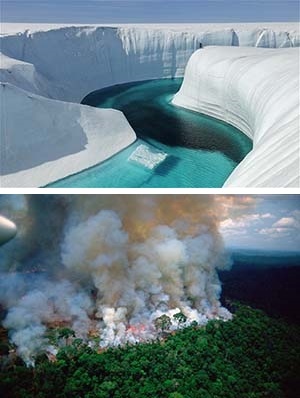You are here
GH 301: Literature and the Climate Crisis
 On examining his photographic evidence of Iceland’s Solheim Glacier’s extraordinary retreat and deflation just between 2006 and 2009, James Balog, founder of the Extreme Ice Survey, says, “When I saw that glacier dying it was like ‘wow.’ You know we [and here he pauses, checked by sudden emotion], if a glacier that’s been here for 30,000 years or 100,000 years is literally dying in front of my eyes, you are very aware of the fact that sometimes you go out over the horizon and you don’t come back.” Human-caused global warming and climate change constitute this inexorably encroaching “horizon of dread,” in the words of the poet Seamus Heaney. How we as individuals, as communities, and as a species apprehend and confront our civilization’s catastrophic handiwork is the subject of this course. We begin by considering the general power of literature (be it poetry, fiction, or nonfiction) to awaken us to what poet Elizabeth Bishop calls the “the art of losing”—how literature offers us an alternative knowledge about the world and ourselves living in this world defined by loss and limit as well as breath-taking fecundity and beauty. But, knowledge of loss provokes further questions: how, for instance, can we mourn the loss of an ecosystem or a species—or a human way of life? What do we call the last member of a species? The course then conducts a basic review of the evidence of anthropogenic climate change and considers the myriad disciplines through which this multifaceted and accelerating phenomenon must be confronted. Finally, we return to selected literary texts that explicitly address climate change—its human and geologic scales as well as timeframes—and that ask: where do we go from here?
On examining his photographic evidence of Iceland’s Solheim Glacier’s extraordinary retreat and deflation just between 2006 and 2009, James Balog, founder of the Extreme Ice Survey, says, “When I saw that glacier dying it was like ‘wow.’ You know we [and here he pauses, checked by sudden emotion], if a glacier that’s been here for 30,000 years or 100,000 years is literally dying in front of my eyes, you are very aware of the fact that sometimes you go out over the horizon and you don’t come back.” Human-caused global warming and climate change constitute this inexorably encroaching “horizon of dread,” in the words of the poet Seamus Heaney. How we as individuals, as communities, and as a species apprehend and confront our civilization’s catastrophic handiwork is the subject of this course. We begin by considering the general power of literature (be it poetry, fiction, or nonfiction) to awaken us to what poet Elizabeth Bishop calls the “the art of losing”—how literature offers us an alternative knowledge about the world and ourselves living in this world defined by loss and limit as well as breath-taking fecundity and beauty. But, knowledge of loss provokes further questions: how, for instance, can we mourn the loss of an ecosystem or a species—or a human way of life? What do we call the last member of a species? The course then conducts a basic review of the evidence of anthropogenic climate change and considers the myriad disciplines through which this multifaceted and accelerating phenomenon must be confronted. Finally, we return to selected literary texts that explicitly address climate change—its human and geologic scales as well as timeframes—and that ask: where do we go from here?
Instructor: Dr. Brendan Corcoran
Dr. Brendan Corcoran is an Associate Professor of English at Indiana State University. His scholarship focuses on twentieth-century and contemporary Irish and British poetry as well as British Romantic poetry and literary responses to the climate crisis. He teaches a wide range of courses in the English Department.
Please contact Dr. Corcoran if you have any questions about this class.
Contact
Greg Bierly, Dean
Pickerl Hall 110
Indiana State University
812.237.3225
812.237.3676 fax
Office Hours:
Monday-Friday
8:00 AM - 4:30 PM
